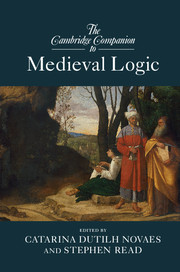Book contents
- Frontmatter
- Contents
- List of Contributors
- Introduction
- PART I PERIODS AND TRADITIONS
- 1 The Legacy of Ancient Logic in the Middle Ages
- 2 Arabic Logic up to Avicenna
- 3 Arabic Logic after Avicenna
- 4 Latin Logic up to 1200
- 5 Logic in the Latin Thirteenth Century
- 6 Logic in the Latin West in the Fourteenth Century
- 7 The Post- Medieval Period
- PART II THEMES
- Bibliography
- Index
1 - The Legacy of Ancient Logic in the Middle Ages
from PART I - PERIODS AND TRADITIONS
Published online by Cambridge University Press: 05 September 2016
- Frontmatter
- Contents
- List of Contributors
- Introduction
- PART I PERIODS AND TRADITIONS
- 1 The Legacy of Ancient Logic in the Middle Ages
- 2 Arabic Logic up to Avicenna
- 3 Arabic Logic after Avicenna
- 4 Latin Logic up to 1200
- 5 Logic in the Latin Thirteenth Century
- 6 Logic in the Latin West in the Fourteenth Century
- 7 The Post- Medieval Period
- PART II THEMES
- Bibliography
- Index
Summary
INTRODUCTION
Both the Latin and Arabic medieval logical traditions drew heavily on materials and ideas produced in Greek Antiquity. Among other things, they inherited from late ancient commentators on Aristotle the very notion of logic as a discipline, a set of canonical texts organised in accordance with a stable division of logical contents, an exegetical method, an epistemological orientation of logic in which the theory of demonstrative knowledge is the culmination of logical teaching, and a defined pedagogical and scientific status within the philosophical curriculum, one in which logic is both a necessary starting point and an instrument for other sciences (see Sorabji 2004, 31ff.).
Traditionally, historians of logic identify two main ancient logical traditions: one stemming from Aristotle's writings (fourth century BC), the other from the Stoics. As we know it today, Aristotle's logic, the Organon, contains the Categories, which deals with the ten types of predicates; the Perihermeneias (On Interpretation), devoted to statements and their properties; and then the treatises about argumentation: syllogistic (Prior Analytics), demonstrative proof (Posterior Analytics), topical and dialectical argumentation (Topics), and fallacious arguments (Sophistical Refutations). To these, the Rhetoric and Poetics are sometimes added in a “long Organon”, which was standard in Arabic logic (see Black 1990) and was conveyed to the Latin world especially through Al-Farabi's influential Division of the Sciences. The long version was adopted by Thomas Aquinas in the thirteenth century, though never effective in practice (see Marmo 1990; Brumberg-Chaumont 2013a).
According to ancient testimonies, Stoic logic was divided into dialectic, concerned with dialogical argumentation, and its “counterpart”, rhetoric, a continuous discourse governed by the quest for truth in public context; two other parts are also mentioned, one about definitions, the other about the criteria for true representations. Dialectic dealt, on the one hand, with “signifying expressions”, in particular the parts of speech (the so-called “Stoic grammar”) and linguistic ambiguity and, on the other hand, with the “meanings”, especially propositions and their structure, classifications of propositions, and propositional syllogistic.
The two traditions are nevertheless not on a par from a historical point of view. Aristotle's numerous logical writings described in ancient lists had already almost been entirely lost in the next generation after Aristotle and Theophrastus.
Information
- Type
- Chapter
- Information
- The Cambridge Companion to Medieval Logic , pp. 19 - 44Publisher: Cambridge University PressPrint publication year: 2016
Accessibility standard: Unknown
Why this information is here
This section outlines the accessibility features of this content - including support for screen readers, full keyboard navigation and high-contrast display options. This may not be relevant for you.Accessibility Information
- 4
- Cited by
